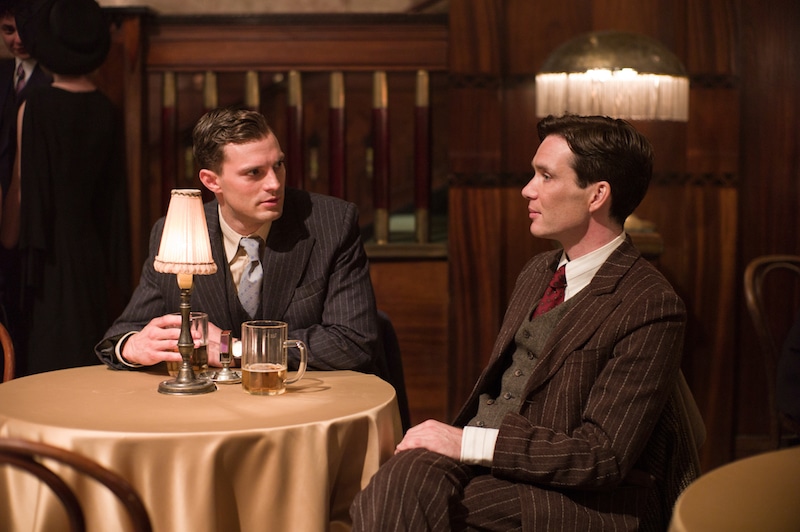
The well of World War II Nazi movies never seems to run dry, even though the epic conflict ended over 70 years ago.
The latest entry is Anthropoid, opening in theaters today. The film is named after the plot to assassinate SS General Reinhard Heydrich, one of Hitler’s top henchmen, known as the Butcher of Prague for the cruelties he imposed on the Czech population and who was also one of the architects of the Final Solution that resulted in the Holocaust.
Anthropoid somewhat surprisingly stars two of filmdom’s most scintillating new leading men — English actor Jamie Dornan, of 50 Shades of Grey fame, and Irishman Cillian Murphy, a rising presence in English and American cinema.
They play the heroic but decidedly dour assassins in what is a relentlessly grim film bereft of any hint of optimism from start to finish, let alone a glint of the glamour that the stars have become known for.
Suffice it to say that though the film can be admired for its craft, it is all but impossible to enjoy or savor.
Despite a blockbuster-scale finish, one leaves the theater feeling brutalized and depressed, with no sense of uplift.
Dornan and Murphy respectively play Jan Kubiš and Josef Gabčík, two Czech expats, who parachute into the country, left largely to their own scant resources as they try to hook up with members of the resistance in Prague.

They are meant to carry out the plot hatched by the Czechoslovak government-in-exile in London, at the prodding of the British and French to do something for the war effort.
These Allies for their part had meekly sold out Czechoslovakia at Munich in 1938, handing a large portion of the country to Hitler that later encouraged him to start World War II a year later.
This is one of the troublesome historical and moral ambiguities surrounding the assassination of Heydrich, along with the murderous retaliation the Nazis visited on 5,000 innocent Czechs in retribution.
Did the Czech government feel pushed by the Allies to act, even though it knew that even if successful, the consequences would be horrendous to the populace?
But aside from some sentences in a crawl of the screen at the start and end of the film alluding to these important framing events, this context is largely absent from the film itself, to its detriment.
Instead director Sean Ellis, for whom the film had clearly become a passion project ever since he became fascinated by the incident when he first learned about it in 2001, sticks closely to the central events and focuses on the dilemma of the two main characters in plotting and carrying out the assassination.
As a result, the first two-thirds of the film takes place at a pretty rather slow burn. There is little taut suspense to draw the audience in.

Two female characters are introduced who first provide some necessary cover but later become romantically involved to various degrees with Jan and Josef.
This is not an invention of director Ellis, who also wrote the screenplay with Anthony Edward Frewin and also was the film’s cinematographer. The women, played by Charlotte Le Bon and Anna Geislerová, were actual participants in the historical events.
The plot pivots into high drama in the final act as the assassination of Heydrich in his auto unfolds. Though ultimately successful, it is messy in its execution. Use of a pistol goes awry so a bomb is hurled, seriously injuring the SS General. He dies of his wounds a week later.
The death of Heydrich — the only successful assassination of a top Nazi during the war — is largely obscure to today’s audiences, a mere footnote for those who know the story at all, even though it has been depicted in several previous movies. The most successful is probably Operation: Daybreak released in 1975 which starred Timothy Bottoms and was directed by Lewis Gilbert, who helmed several of the James Bond flicks.
The question arises as to why director Sean Ellis wanted to make a film reprising the Heydrich story which in totality is such a down.

Anthropoid does not have the high drama of Valkyrie (2008), starring Tom Cruise, about the failed attempt to assassinate Hitler in his lair by German military officers attempting a coup, which if it had succeeded would have changed the course of the war which the killing of Heydrich did not.
Potentially this year’s best new movie about the Nazi era is The People Vs. Fritz Bauer, a German-made film that hits U.S. theaters next week, and has already won multiple awards at Berlin’s version of the Oscars.
Taking place almost a decade after World War II ended, it tells the true story of a low-level German bureaucrat. His efforts to ferret out Nazis who had disappeared into placid invisible lives led to the first war crime trials to be held in his country, but at great cost to himself personally. Labyrinth of Lies, another German film on the same subject, came out last year.
There will continue to be films made about the Nazis and the Nazi era. There are surely many stories yet to be told. Son of Saul, the Hungarian film that took audiences into the horrors of Auschwitz through the eyes of one man, won the best foreign film Academy Award earlier this year.
But simply dipping a bucket in the World War II well and coming up with yet another movie about the evil of the Nazis is almost too easy.
Having something new to say or a new insight is much harder. For all its efforts at verisimilitude, that’s where Anthropoid finally falls flat.